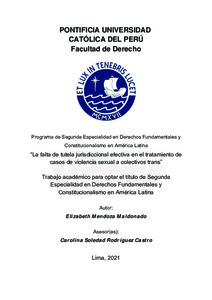| dc.contributor.advisor | Rodríguez Castro, Carolina Soledad | |
| dc.contributor.author | Mendoza Maldonado, Elizabeth | |
| dc.date.accessioned | 2022-05-31T17:42:19Z | |
| dc.date.available | 2022-05-31T17:42:19Z | |
| dc.date.created | 2021 | |
| dc.date.issued | 2022-05-31 | |
| dc.identifier.uri | http://hdl.handle.net/20.500.12404/22515 | |
| dc.description.abstract | La tutela jurisdiccional es el derecho fundamental de cualquier justiciable a obtener una
respuesta eficiente del Estado frente a la vulneración de sus derechos (acceso a la justicia, juez
imparcial predeterminado por ley, derecho a la defensa, derecho a un proceso sin dilaciones
indebidas, debida motivación de las resoluciones o sentencias, cosa juzgada; y, derecho a la
efectividad de las resoluciones o sentencias). A través de una aproximación analítica a la
doctrina, normas y jurisprudencia nacional e internacional se evidencia que la regulación
peruana no es efectiva para proteger de forma eficiente el derecho a la tutela jurisdiccional
efectiva de personas trans que han sido víctimas de violencia sexual. Esto debido a que
contamos con una regulación ineficiente e ineficaz, así como un tratamiento estatal negligente
respecto de las necesidades especiales que este tipo de casos requieren. El Estado peruano no
cuenta con la existencia de un protocolo de investigación y administración de justicia durante
los procesos penales para casos de personas LGBTIQ+ víctimas de violencia; las
investigaciones penales de estos casos suelen adolecer de perspectiva de género; tampoco
existe un plan de capacitación y sensibilización sobre violencia contra las personas LGBTIQ+
efectivo y eficaz ni existe un sistema de recopilación y producción estadística de violencia
contra personas LGBTIQ+. Debido a lo anterior, es preciso llevar a cabo medidas de corrección
para garantizar el acceso a la tutela jurisdiccional efectiva en casos de violencia sexual a
personas trans como contar con una regulación específica que reconozca la incidencia de estos
actos de discriminación, así como la necesidad de contar con refuerzos normativos y criterios
jurisprudenciales. | es_ES |
| dc.description.abstract | The effective judicial protection is the prime human right to have an efficient answer from the
State (access to justice, an impartial judge predetermined by law, defense right, right to a trial
without undue delay, due motivation of resolutions or sentences, res judicata effect, and, the
right to the effectiveness of resolutions or sentences). The Peruvian regulation about trans
sexual violence is inefficiently. The main reason is because we have inefficient and ineffective
regulation, as well as negligent State's treatment regarding the special needs that these types of
cases require. The Peruvian State does not have a protocol for the investigation and
administration of justice during criminal proceedings for cases of LGBTIQ + victims of
violence; the criminal investigations does not have gender perspective; there is also no effective
and efficient training and awareness plan on violence against LGBTIQ + people, nor is there a
system for the collection and statistical production of violence against LGBTIQ + people. Due
to the foregoing, it is necessary to carry out corrective measures to guarantee access to effective
judicial protection in cases of sexual violence to transgender people, such as having a specific
regulation that recognizes the incidence of these acts of discrimination, as well as the need to
have normative reinforcements and jurisprudential criteria. | es_ES |
| dc.language.iso | spa | es_ES |
| dc.publisher | Pontificia Universidad Católica del Perú | |
| dc.rights | info:eu-repo/semantics/openAccess | es_ES |
| dc.rights.uri | http://creativecommons.org/licenses/by-nc-sa/2.5/pe/ | * |
| dc.source | Pontificia Universidad Católica del Perú | |
| dc.source | Repositorio de Tesis - PUCP | |
| dc.subject | Tutela jurisdiccional--Perú | es_ES |
| dc.subject | Derechos fundamentales--Perú | es_ES |
| dc.subject | Violencia de género--Perú | es_ES |
| dc.subject | Violencia sexual--Perú | es_ES |
| dc.title | La falta de tutela jurisdiccional efectiva en el tratamiento de casos de violencia sexual a colectivos trans | es_ES |
| dc.type | info:eu-repo/semantics/bachelorThesis | es_ES |
| thesis.degree.name | Segunda Especialidad en Derechos Fundamentales y Constitucionalismo en América Latina | es_ES |
| thesis.degree.level | Título Profesional | es_ES |
| thesis.degree.grantor | Pontificia Universidad Católica del Perú. Facultad de Derecho | es_ES |
| thesis.degree.discipline | Derechos Fundamentales y Constitucionalismo en América Latina | es_ES |
| renati.advisor.dni | 45577436 | |
| renati.advisor.orcid | https://orcid.org/0000-0003-2883-9361 | es_ES |
| renati.author.dni | 70126256 | |
| renati.discipline | 421189 | es_ES |
| renati.level | https://purl.org/pe-repo/renati/level#tituloSegundaEspecialidad | es_ES |
| renati.type | https://purl.org/pe-repo/renati/type#trabajoAcademico | es_ES |
| dc.publisher.country | PE | es_ES |
| dc.subject.ocde | https://purl.org/pe-repo/ocde/ford#5.05.01 | es_ES |






